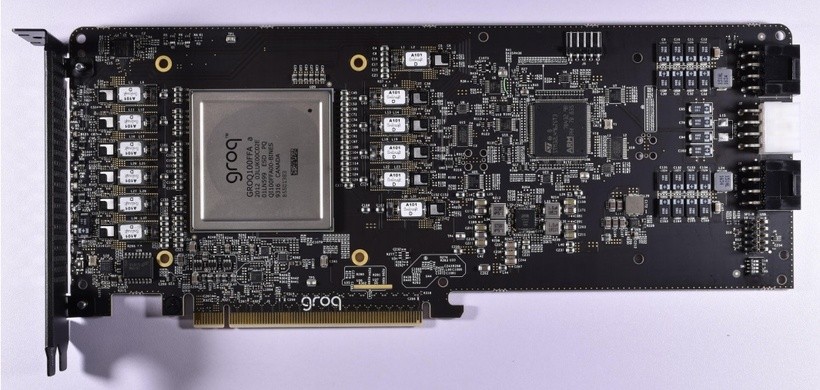LPU (Language Processing Unit)
Language Processing Units (LPUs) are a relatively new addition, designed specifically for handling the complexities of natural language processing tasks. While CPUs, GPUs, and TPUs play significant roles in the broader field of AI, LPUs offer optimized performance for generative models that deal with text, such as GPT (Generative Pre-trained Transformer). They’re good at these tasks and might be more efficient than Graphics Processing Units (GPUs). GPUs are still great for things like graphics and AI.The true power of generative AI comes from the interplay and integration of these processing units. CPUs handle the overarching control and coordination, GPUs accelerate the bulk of computational workloads, TPUs offer specialized efficiency for deep learning, and LPUs bring a new level of performance to natural language processing. Together, they form the backbone of generative AI systems, enabling the rapid development and deployment of models that can create highly realistic and complex outputs.
1. LPU vs GPU: Key Differences ?
-
Architecture: LPUs employ sequential processing, meticulously handling tasks step-by-step, mirroring the natural flow of language. In contrast, GPUs leverage parallel processing, tackling multiple computations simultaneously, which is highly effective for graphics rendering and other tasks involving numerous independent calculations.
-
Specialization: LPUs are highly specialized for language-intensive tasks, boasting optimized hardware and software designed specifically for this domain. GPUs, on the other hand, are general-purpose, offering versatility across various computationally demanding applications, not just language-related ones.
-
Applications: LPUs shine in natural language processing (NLP) tasks, including machine translation, sentiment analysis, and chatbot development. GPUs remain dominant in graphics processing for video editing and gaming, while also proving valuable in scientific computing, machine learning, and diverse AI applications due to their broader functionality.
2. Pros and Cons of LPU
Pros |
FHigh Efficiency: LPUs excel in language processing tasks, achieving faster processing times and lower power consumption compared to general-purpose CPUs. Specialized Hardware & Software: Specialized Hardware & Software: Their dedicated architecture and software tools can optimize performance for specific language tasks. |
Cons |
Limited Application Scope: Limited Application Scope: LPUs are currently in the early stages of development and their applications are primarily focused on language processing. Availability & Costt: Availability & Cost: As a relatively new technology, LPUs may have limited availability and potentially higher costs compared to well-established GPUs. |
3. Pros and Cons of GPU
Pro |
Versatility: GPUs offer broad application potential beyond graphics, handling tasks like video editing, scientific computing, diverse AI applications, and even some aspects of machine learning. Established Technology: GPUs are a mature technology with extensive support, readily available hardware, and well-developed software libraries. |
Cons |
General-Purpose Design: While versatile, GPUs may not always achieve the same level of efficiency as specialized processors like LPUs in specific tasks, particularly language processing. Higher Power Consumption:: The parallel processing architecture of GPUs can lead to higher power consumption compared to LPUs designed for specific tasks. |
4. When to use LPU vs GPU ?
LPUs: Shine in tasks involving natural language processing (NLP): This includes machine translation, where LPUs can efficiently translate languages while minimizing errors. They are also well-suited for sentiment analysis, understanding the emotional tone of text, and AI chatbot development, allowing chatbots to interact in a more natural and efficient manner.
GPUs: Remain the preferred choice for tasks requiring high graphical processing power: This includes video editing, rendering complex visuals in movies and animations, and gaming, ensuring smooth performance with high frame rates. Additionally, GPUs are valuable for scientific computing, handling complex simulations and calculations, and general-purpose AI tasks, offering a versatile solution for various AI applications not primarily focused on language.
5. Conclusion
Language processing units represent a significant advance in the field of artificial intelligence, designed to harness the power of language in ways unimaginable. Groq’s pioneering work in developing and deploying LPU technology not only enhances today’s AI applications, but also paves the way for the next generation of AI applications. AI. As LPUs become more widespread, we can expect a surge in AI applications that are more responsive, more intelligent, and more integrated into our daily lives. Beyond public applications, LPUs will also contribute to progress in areas such as health, they can be used to analyze and understand volumes of medical texts, and in In the financial domain, they can analyze reports and news in real time to inform business decisions.
 .pdf
.pdf
